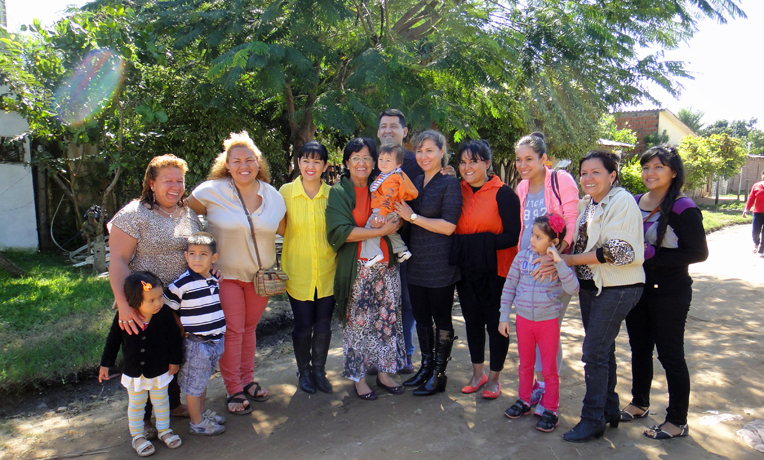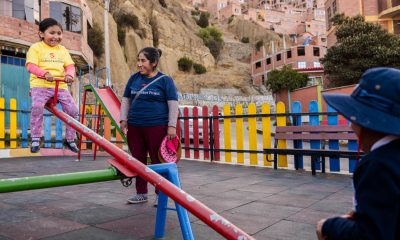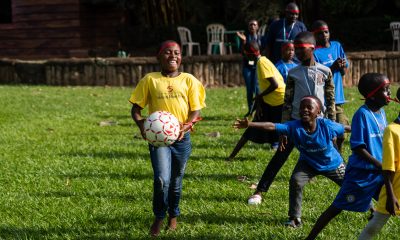The mother of a boy with a heart defect transports a Children’s Heart Project patient home
Mari Krueger traveled to Santa Cruz, Bolivia, this summer to transport a Children’s Heart Project patient
As low points go, it was low. We celebrated the end of 2013 with the happy news that our family was finally expanding. But the first week of 2014, the news was different—another miscarriage. We couldn’t seem to shake 2013 after all. We approached the one-year anniversary of Isaac’s heart surgery and the journey to Atlanta for the worst day of our lives.

Mari holds Santi, a Children’s Heart Project patient, outside his home in Bolivia.
I felt like I was in a hole. Stuck. Our family shrinking—again—at a time we’d hoped it would get bigger. Trapped in January. I had this suffocating desire to escape, with the simultaneous knowledge that I could never escape my rejecting, ill body. I didn’t want to talk to anyone, didn’t want to be around people, and I felt totally demotivated and helpless. I hate feeling helpless. I organized the kitchen. I researched organizations for heart patients.
Shortly after Isaac’s surgery, I’d read an article about the Samaritan’s Purse Children’s Heart Project. It coordinates surgeries for kids with heart defects in developing countries. Without the operations, the kids will die, but there are no doctors or facilities to perform the complicated procedures in some countries. Children’s Heart Project screens kids in-country, gets them visas, finds hospitals to donate surgeon time, and flies them to North America.
I couldn’t even finish reading the article about it last year. It was too raw. Our hugest praise after Isaac’s diagnosis was that we had been blessed with the resources to get him the lifesaving surgery he needed. My heart completely broke for moms without that option. I set the article aside, but I didn’t forget.
In the pit of dread approaching the anniversary, I researched the organization again. Online, people were encouraged to help by praying, fundraising, and—for parents of heart patients—talking to their cardiologists or surgeons about getting surgeries donated. I wanted to do that for Isaac to thank God for saving his life.

Santi’s brother was excited to see him finally healed.
I didn’t want to focus on the heartbreak of 2013; I wanted to move forward trusting God. I filled out a form with a little bit about Isaac and our desire to help. They responded immediately with more information about the program and questions about Isaac’s doctors and surgeon.
A couple of weeks later, I was delighted by an unexpected email that popped into my inbox. The Children’s Heart Project travel coordinator asked me to apply to be a transporter. Doctors or pediatric nurses meet the heart patients in their home countries and transport them, their mothers, and translators to the North American city where they’ll have surgery. Afterward, they need someone else to escort them home.
The purpose is twofold. Many patients and their families have never flown at all, much less internationally, and, to get their visas approved with the embassy, Children’s Heart Project guarantees they’ll be accompanied at all times. They need people with flexible schedules, who are comfortable traveling internationally, who preferably have some link to heart surgery, and who can go to the patient’s home country. It includes navigating airports, paying for meals, keeping track of receipts, and generally assisting the group in transit.
It was still hard for me to imagine there could be usefulness at the intersection of “got stationed overseas and spent too much time in airports” and “kid had heart surgery,” but I applied. If I’d received the Children’s Heart Project invitation to apply any earlier, I wouldn’t have been interested because I had just had a miscarriage, or I was pregnant, or I was sick, or I was quarantined with my son after surgery, or I was in the middle of his surgery, or I had no connection to heart surgery. I managed to apply in the small window before I found out I was pregnant again.
I submitted the application in January and found out in early March that I would get to transport a little boy named Santi home to Bolivia after surgery. I started praying for him immediately.
“He heals the brokenhearted
And binds up their wounds”
(Psalm 147:3, NKJV).
All About Santi
Pneumonia landed Santi in the hospital at just 6 weeks old. That’s when his heart defect was detected. His heart wasn’t pumping the oxygenated blood from his lungs to his body, leaving him tired and weak. He fought off the pneumonia but was back in the hospital soon afterward for three months, this time battling an infection.
“The first time I saw him, I didn’t know if he would be a good candidate for surgery,” said Carola Contreras, the Children’s Heart Project coordinator in Bolivia. “He was so small, and with the IVs and oxygen tubes everywhere, we weren’t sure he was going to make it. But he recovered from that, made it to Canada for surgery, and now look at him—look what God has done!”

Anita’s two older boys had been without her for nearly a year since she had spent most of her time in the hospital with Santi. The homecoming was a reunion that had taken many months to happen.
Once we arrived back in Bolivia together, we had to take taxis to Santi’s home. He fell asleep in my arms during the ride. When we arrived at his home and his mom, Anita, jumped out of the first taxi to hug everyone, I wasn’t sure what to do. I didn’t want to intrude on this emotional reunion, but I was holding the baby in the second taxi. I eventually climbed out onto the dirt road as a 7-year-old boy came tearing around the cab.
“Donde esta mi hermanito?” (“Where is my little brother?”) He reached out his arms and squeezed Santi’s ankles and touched his hands. Then someone scooped Santi out of my arms and began passing him around. When I’d heard Santi had two older brothers, I wanted to bring them some little presents. It seemed like a scary situation for a kid to be without his mother while she’s in a far-off country with a sick little brother.
What I hadn’t realized was how long the boys had really been without their mom and little brother. The hospital where Santi spent months before traveling to Canada is an hour from the family’s home. Anita had lived at the hospital with him while the older boys, 7 and 10, stayed home with their grandma, aunt, uncle, and cousin. This wasn’t just a homecoming after three months. Most of the last year had involved a lot of stress and separation for this family.
The 7-year-old tucked himself under his mom’s arm and periodically returned there to roost, reassuring himself she was there. Anita was attentive to him, leaning close, listening to him, and holding him whenever he came near. The older boy immediately began to tattle on him for acting out at school, which he denied. That made all the aunties and friends laugh, and the boys ran off to play with and hold Santi.

Santi’s pastor (center) was excited to see him home and healthy. She had convinced Anita to take him to America despite her fears.
Anita supports her boys by cleaning houses. When Santi’s surgery was delayed, forcing them to stay another month in Canada, the host family had a good idea. Could Anita turn her love of pretty nail polish into a career shift? They called their friends and asked them to help out.
Bags of high quality colors and nail care tools poured in. Anita now plans to take the necessary classes to get her manicurist’s license. The boys’ dad is not in the picture, so increasing her income will make a huge difference in their family.
Anita’s eyes had filled with tears as we sat next to each other on the airplane, Santi sleeping in her arms. She was telling me about his initial diagnosis, hospital visits, and health scares. She called Carola constantly to ask her to save Santi’s life, and now she finally had the hope of a better life with the ability to earn more money for her kids. Tears leaked down her cheeks as she talked about how God used this terrifying ordeal with Santi’s heart to change everything about their lives for the better.
“This morning, I thanked God,” she said. “It’s the best birthday present.”
Gloria a Dios!
As friends and aunties passed Santi around, an older woman approached me.
“Gloria a Dios!” (“Glory to God!”) She said to me through tears, kissing my cheeks and taking my hands. She is the pastor of Anita’s church.
Anita had come to her and said she was terrified to come home from this journey with empty arms. The pastor said she had to go because Santi had already almost died of an infection. She had to trust God with the outcome.
I empathized with that fear. The thought of an empty car seat and a silent drive back to Florida from Atlanta in January 2013 had haunted me.
And now, Anita had arms not empty but three times as full. Everyone said Santi had tripled in size, even though he is still fewer than 20 pounds at 14 months old.
“Gloria a Dios!” the pastor said again, squeezing my hands and leading me to the courtyard for a prayer of thanks and praise to God.






